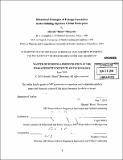Rhetorical strategies of foreign executives in revitalizing Japanese global enterprise
Author(s)
Hatayama, Hiroaki
DownloadFull printable version (4.171Mb)
Other Contributors
Sloan School of Management.
Advisor
Leigh Hafrey.
Terms of use
Metadata
Show full item recordAbstract
Carlos Ghosn of Nissan and Sir Howard Stringer of Sony are the first non-Japanese top executives of Japanese global enterprises. At the time they were appointed CEOs, both companies were in crisis: Nissan almost facing bankruptcy and sale; Sony coping with a huge deficit and threats from emerging competitors. The main question in this paper is how Ghosn and Stringer lead and manage their companies through executive discourses, and what the implications are for other executives of Japanese global companies. First, I describe the situations at Nissan and Sony when Ghosn and Stringer became CEOs, and review relevant research on executive discourse to set up frames for analysis of their discourse. Then I establish a theoretical approach to this analysis with concepts and methods of rhetoric and corpus linguistics. For data, I choose three distinctive texts for each person. I articulate the discourse features of Ghosn and Stringer and argue why they could be of value to Japanese executives who may not have adopted those strategies. Their "foreignness" is one factor, but cultural values in Japan, including seniority and hierarchic human relationships, are also critical. I also argue that Ghosn and Stringer have their own rhetorical strategies that are different from those of Japanese executives. In order to show how the analysis of Ghosn and Stringer discourses bear on Japanese CEO rhetorical practice, I offer a similar, quick analysis of a speech by Akio Toyoda that reflects the roles of seniority and courtesy in traditional Japanese discourse, even in a globalized business world. After discussing the speech and the local, culturally determined rhetorical principles it reflects, I suggest a hybrid model, working with four concepts-Relative Self, Audience, Contents and Form, and The Situation-that can serve Japanese CEOs who need to access global audiences.
Description
Thesis (M.B.A.)--Massachusetts Institute of Technology, Sloan School of Management, 2010. Cataloged from PDF version of thesis. Includes bibliographical references (p. 55-57).
Date issued
2010Department
Sloan School of ManagementPublisher
Massachusetts Institute of Technology
Keywords
Sloan School of Management.